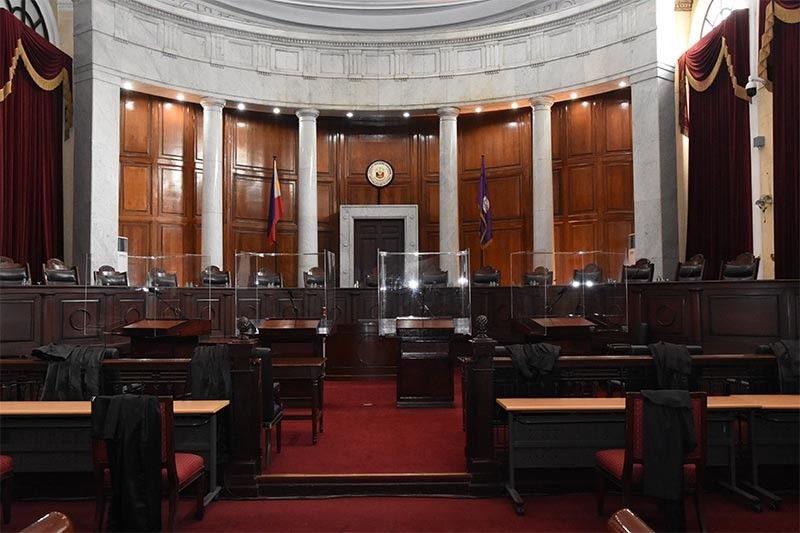Debates on oral arguments on anti-terrorism law reset to March 2

MANILA, Philippines — The Supreme Court on Monday reset the fourth day of the oral arguments on the Anti-Terrorism Act petitions to March 2.
“Considering that some of the Justices are on self-quarantine as a health precaution against COVID-19, you are hereby informed per instruction of the Honorable Supreme Court, of the suspension of the oral arguments scheduled on February 23, 2021,” the one-page notice from the Office of the Clerk of Court read.
The SC has not identified the magistrates on quarantine.
Oral arguments will resume on March 2, 2:30 p.m.
The SC was supposed to resume its interpellation of the petitioners on February 26. So far, only eight justices have propounded their questions to the seven oralists, with Associate Justice Amy Lazaro-Javier intending to resume her interpellations on the fourth day of debates.
At a chance interview last Friday, Chief Justice Diosdado Peralta said they did not expect that a lot of their colleagues will ask a lot of questions to the petitioners, but they are hoping interpellation of petitioners will be finished on Tuesday.
Solicitor General Jose Calida, counsel for the respondents, has yet to present his opening statement, the government’s defense against the 37 petitioners lodged against the anti-terrorism law. The two amici curiae or “friends of court” have also yet to present their statements.
Since the suspension of session on February 16, petitioners composed of Indigenous Peoples and Moros have brought to the SC’s attention the arrest of two petitioners, Windel Bolinget and Chad Errol Booc.
In a manifestation filed last Wednesday, the petitioners told the court that the arrest of Bolinget and Booc “show the imminent danger that human rights defenders and dissenters face, particularly with the passage of the Anti-Terror Law.”
Rep. Edcel Lagman (Albay) also pressed the SC to issue a temporary restraining order against the law, citing Booc’s arrest and “threats” of prosecution by a certain military official under the law.
Peralta asked Lagman to put this in writing, noting that the lawmaker is reiterating the petitioners’ plea for TRO, so the Calida can comment on it. Deliberations on the prayer may follow.
Meanwhile, recaps of the first three days of oral arguments may be read here, here and here.
President Rodrigo Duterte signed the Anti-Terrorism Law on July 3 despite opposition from rights groups and civil society groups that it could be used to stifle human rights.
A petition against the law has been filed at the Supreme Court and other groups are preparing pleadings of their own.
Follow this page for updates. Photo courtesy of The STAR/Michael Varcas
National Security Adviser Hermogenes Esperon moves to block access to several websites, including news sites of alternative news orrganizations Bulatlat.com and Pinoyweekly.org.
In his letter to the National Telecommunications Commission, he only says the websites are "affiliated to and are supporting these terrorists and terrorist organizations."
No other basis to back up his allegation was cited in the letter.
Citing the designation of the CPP-NPA-NDF as terrorists, NSA Hermogenes Esperon moves to block access to several sites.
— Kristine Patag (@kristinepatag) June 22, 2022
In Esperon's letter to the NTC, he included news sites @bulatlat and @pinoyweekly; sites of other progressive groups RMP and Save our Schools. @PhilstarNews pic.twitter.com/nAzMITJFsS
The Commission on Human Rights says it "partly welcomes" the Supreme Court decision that some parts of the controversial Anti-terrorism Law are unconstitutional.
CHR spokesperson Jacqueline de Guia says the commission remains hopeful that the remaining contentious provisions of the law will be clarified by the high cour in the full text of the decision.
"At the same time, our commitment remains in guarding against possible human rights violations arising from the implementation of the anti-terror law. We steadfastly remind the government that countering terrorism and protecting human rights are not competing values but are, in fact, mutual and complementary," De Guia says in a statement.
The Supreme Court has deliberated and voted on the controversial Anti-Terrorism Act but the decision will be released "at the soonest time possible."
"However, considering that there were numerous issues resolved in the case, as well as the fact that each Justice had to vote on each issue, there is a need to accurately confirm and tally the vote of each Justice in order to ensure the correct resolution of the Court per issue," SC spokesperson Brian Hosaka says.
The Anti-Terrorism Council designates the National Democratic Front of the Philippines, the panel that negotiates for communist rebels during peace talks a terrorist organization.
Previous designation of the Communist Party of the Philippines and New People's Army led to the designation of supposed members of the CPP's Central Committee. Among those designated as terorrists were peace consultants.
Designation gives the Anti-Terrorism Council the authority to investigate and freeze the accounts of designated persons.
The Anti-Terrorism Council has designated 29 people, including alleged members of the Communist Party of the Philippines-New People's Army, as terrorists in two resolutions.
Designation allows the Anti-Money Laundering Council to freeze the assets of those on the list.
- Latest
- Trending

































